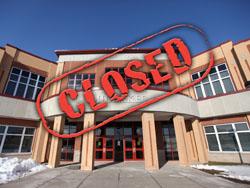Thanks to an on-time state budget that cuts $1.3 billion to K-12 schools and more than $300 million to higher education, students will pay the price in increased class sizes, program cutbacks or higher fees.
On the heels of a candlelight vigil where more than 1,000 gathered to bear witness to the impact the cuts will have, NYSUT members continued a relentless defense of public schools during meetings with lawmakers May 10.
Maureen Senska from the Canandaigua Teachers Association told Assemblyman Brian Kolb's staff that her Finger Lakes school district has lost 66 positions the last two years because of a 14.1 percent state aid cut. Canandaigua is Kolb's home school district.
"Four teachers from my building are leaving the state," she said. "These are the day-to-day realities we're dealing with."
Senska traveled to Albany for NYSUT's Committee of 100 advocacy day, part of the union's campaign for public education. The litany of concerns members brought to lawmakers reads like a Nightmare on School Street.
 Jeff Beall from the Phelps-Clifton Springs TA spoke about the closing of the Midlakes Middle School.
Jeff Beall from the Phelps-Clifton Springs TA spoke about the closing of the Midlakes Middle School.
"We know the fiscal realities but this is a shock to our entire community," he said about the district's plan. "Putting 11- to 13-year-olds into a high school is against the educational needs of these students."
Ellen Mancuso from Monroe Community College in Rochester said similar things are happening to higher education.
"SUNY took 26 percent of the cuts in the state budget last year," she said. "How can they keep cutting when they always tell us how important higher education is?"
"What does it mean to a community when the state even thinks about 100 percent defunding of its university hospitals?" Kathy Southerton of the SUNY Stony Brook Health Sciences Center chapter of United University Professions asked Assemblyman Steven Englebright, D-Setauket. The governor's proposed budget sought to eliminate all direct state support for SUNY’s three teaching hospitals - Stony Brook Health Sciences Center, Downstate Medical University in Brooklyn, and Upstate Medical University in Syracuse. $60 million was restored in the budget adopted March 31, but that is still below what the teaching hospitals need, Southerton said.
Leaders from North Country locals told state Senator Patty Ritchie, R-Watertown, about the horrors affecting their schools, including 300 educator jobs to be lost in their rural area. Specifics: An elementary school closes in Cape Vincent, all the reading recovery teachers in the Thousand Islands district cut, two math positions in Watertown gone, junior varsity sports and late buses cut in Copenhagen, and the civics, mock trial and state history clubs eliminated in Pulaski.
The more than 400 NYSUT members offered lawmakers a better way than cuts: extend the income tax surcharge on the wealthiest New Yorkers and enact a supplemental budget rather than cut programs, services, jobs and opportunities from pre-K through graduate school.
Pat Kush, a Fulton retiree, asked Ritchie about the refusal to move on the millionaires' tax. "We are the voice of the parents, community and kids. Why do kids have to suffer? Why can't millionaires" also sacrifice?" she asked.
"I feel your pain, I wish there was more money," Ritchie said. "The governor has said he would never support" extending the tax, which is scheduled to expire Dec. 31.
"There is still an opportunity for a do-over," said Carol Blackburn from the Phoenix CSTA, about the possibility of the millionaires' tax supplying much-needed revenue. "Too many districts are in desperate straits."
More than 13,000 education jobs could be lost statewide, compounding the loss of more than 10,000 positions last year. Many of the projected layoffs are in New York City, where Mayor Michael Bloomberg announced more than 4,278 teachers would be cut even though the city has a surplus of reserve funds.
United Federation of Teachers members Alfred Gonzales, Donna Mangangello, Zina Burton-Myrick and Wilma Velasquez got a sympathetic ear from Sen. Daniel Squadron, D-Manhattan, about the impact that will have in the classroom. Increased class sizes and cutbacks in counseling and social work will have a huge impact at all levels, they said. Also, foreign language and technical courses will be cut back so severely students will not able to fulfill the requirements to get Advanced Regents diplomas.
"These cuts will cause irreparable damage," Yonkers FT member Deb Collier told an aide to Assemblyman Gary Pretlow, D-Mount Vernon. "We already have 28 kids in a kindergarten classroom with no help of an assistant. Meanwhile, the curriculum demands are being raised and the support is being lowered."
"We realize times are hard. It's impacting working families and the pain is intense," Phil Cleary, who teaches pre-Kindergarten students in the North Syracuse schools, told Sen. John DeFrancisco, R-Syracuse.
The lawmaker disagreed with the dozen central tier advocates about the need for a tax cap (he favors one) and extending the millionaire's tax (he doesn't favor it) but agreed that there is a lot of pain in the budget.
Among the positive meetings with lawmakers, Professional Staff Congress officers Barbara Bowen and Steve London thanked Assemblywoman Cathy Nolan's staff for the Queens Democrat's support of extending the millionaire's tax, and a lower-Hudson contingent applauded Assemblywoman Ellen Jaffee, D-Pearl River, for standing against the proposed tax cap.
"The bottom line is public education is being threatened and we thank you for what you're doing," Donna Ramundo of the Nyack TA said.
"We do need proprety tax relief but a cap doesn't provide it," Jaffee said.